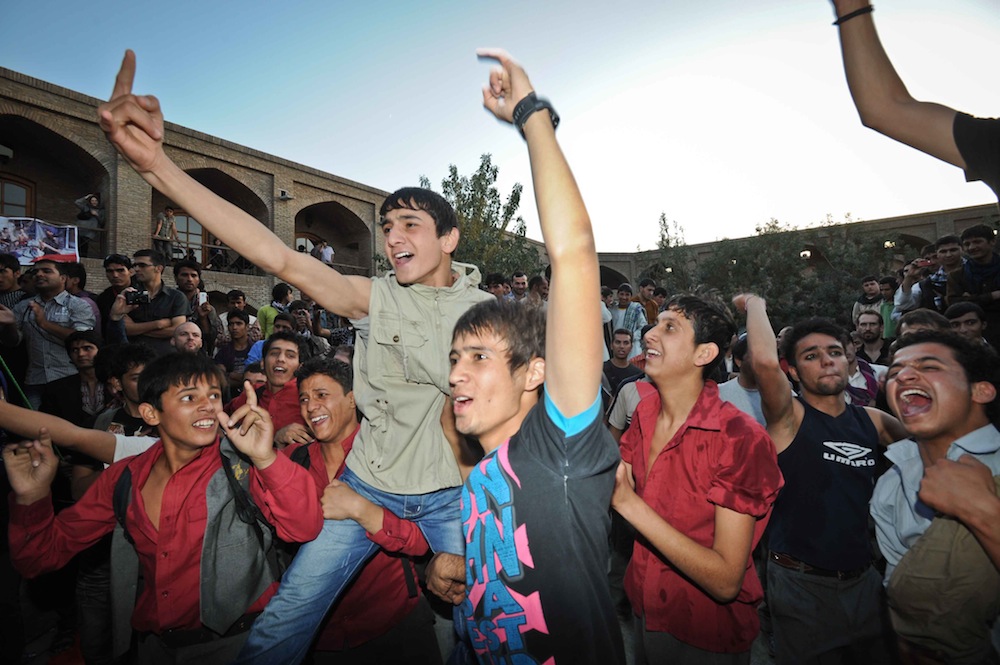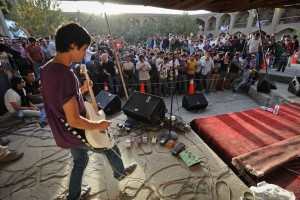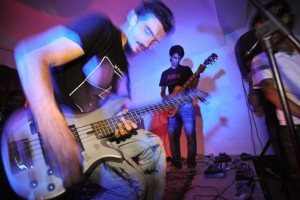THERE IS SOMETHING SEDUCTIVE about loud cathartic music — especially thrash metal, hard rock, punk, and hiphop — that surprises, frightens, and potentially changes a person. Experiencing this music live, one feels energized, arteries pulsating, busting scalps, smashing skull rings, moshing without judgment, and laughing away the head bang sting in steamy crowds of like-minded strangers who can quickly become friends.

How to Rock a War Zone
For years I’ve been searching the globe from Somalia to Chechnya to Iraq to Afghanistan for music that transforms people, that not only helps them escape, but overcome. The journey has led me to focus on people who risk their lives to perform tough, sometimes confrontational music in war zones and totalitarian states.
Consciously or not, performers of tougher genres know that youth, especially young men in war and repression, look to violence as a means of taking power over their otherwise troubled lives. Young men in crises don’t give a shit about star-studded galas for Kerplekistan, We Are the Universe pageants, dove-knitting alliances between Western college kids and war widows, or even aid projects asking them to take accounting classes instead of joining the fight.
What young militia-sought men in crisis zones want, I’ve learned, is to break out of their no-win situation, vent frustration, and celebrate this self-defining tension in some masculine, cathartic way. They want to prove to brothers and potential lovers that they have control, that they are not subjugated, and that they can survive the toughest trauma.
Though most will grab a rifle and join the war anyway, a few may, after running these musicians’ gauntlets of tamed noise and creative camaraderie, decide to leave their rifles and bombs behind, for guitars and drums.
Risking their lives for music
Among these pioneers of sound I’ve discovered, there is Waayaha Cusub, the Somali hiphop and R&B group who are perhaps the most risk-taking of all musicians in this era of war. They are directly challenging extremists and would-be fighters through a series of concerts in East Africa, including their upcoming hiphop concert tour across Somalia to Mogadishu. Their power to persuade actors in the conduct of the Somali War defies all preconceptions about the influence of local musicians.
The south Somalia-based radical rebel group Al Shabab, and their ally, Hezb-ul-Islam, so hate when Waayaha Cusub’s songs light up kids’ cell phones in their area of control — tunes like “Say No to Al Shabab” and “Peace (Imagined)” — that they encouraged gunmen to hunt and shoot singer Shiine Akhyaar, beat singer Digriyo Abdi, and threaten the rest of the band.
Then there is Acrassicauda, the Iraqi thrash metal band, arguably the best known “war zone” act because not only are they badass shredders but thanks to their portrayal in the VICE documentary, Heavy Metal in Baghdad, they have Metallica, Ministry, and the US Department of Immigration’s stamp of approval.
Now in New York planning shows with Ministry’s Al Jorgensen and trying to “go global” and leave the war zone monikers and haters behind, Acrassicauda have inspired others, like Baghdad-based Dog Faced Corpse, to keep torches burning back home in post-war Baghdad despite waves of anti-emo and anti-metal persecution.
There are also scores of bands in the Tehran underground producing rock and dance parties in a country where the government only allows its most vetted and tamed allies to perform live in public. The Casualty Process, an Iranian electronic rock duo now in New York (just one example) had to leave Tehran after they were arrested at a performance of their previous band, The Plastic Wave, simply for jamming at an “unauthorized” event. Though it’s not threatened by war, Iranian musicians instead are threatened by a government with incredibly strict rules about who can perform what in public.
Now in Afghanistan, a decade after the NATO-backed northern alliance overthrew the Taliban and other radicals who banned non-Islamic music and attacked musicians, Kabul and Herat’s creative markets have finally evolved past pop.
Young men who grew up in a blood bath are now seeing even the heavily fortified city as a canvass for “normal” life. Fuck it, if foreign super bands and artists are unwilling to tour through Kabul, then the local community, as new as it was, had to create its own spectacle. That’s how Afghan rockers and their artist and expat allies decided to hold one of the first public war zone rock festivals this past fall.
Since 2002, expats working in Kabul had thrown so many parties to take the edge off that some had formed their own house band, called White City. Singer-bassist-filmmaker Ru Owen combined forces with drummer-aid worker Andronik Stefansson and guitarist-motor punk-filmmaker Travis Beard to form the current lineup of White City, headlining parties at clubs like L’Atmosphere and theaters like the French Institute, often with Kabul Dreams opening for mixed audiences.
By 2010, Afghan metal heads, many of whom had discovered their passion while living as refugees in Iran, where such concerts were illegal, were now returning with a hunger for noise to a country where all non-Islamic music is still banned wherever Taliban rebels rule.
Although Morcha (Antz Band), the blues rock band rising in the western Afghan city of Herat on anthems imagining a “freer” Afghanistan, is likely the first professional post-Taliban rock outfit in-country, it was Kabul Dreams, the trio that began performing at colleges and international parties in 2010, which carved the critical path to global audiences.
Kabul Dreams, including Sulyman Qardash on guitar and vocals, Siddique Ahmed on bass, and Mujtaba Habibi on drums, was not out to break barriers, but simply to entertain, and so they were able to play loud not only behind walls, but even out on the public street between military checkpoints, without causing too much of a stir.
Pals Lemar Saifullah and Qais Shaghasi met filmmaker Travis Beard after a White City show and asked him to borrow rehearsal space and gear. Soon enough, brothers Qasem and Pedram Foushanji showed up looking for the same. Travis introduced the four, stuffed them in a room full of amplifiers, cranked up the volume, and Afghanistan’s first metal outfit was born: District Unknown.
Meanwhile, across town at the Afghan National Institute of Music, violinist-guitarist Hojat Hameed and singer-guitarist Raby Adeb met up with drummer Reshad Afzali and bassist Ratib Ramish. While District Unknown pioneered Afghan doom death and psychadelic metal, this foursome created the band White Page. They began performing metal, heavy rock, and hybrid styles at parties and college events.
Local impressario Humayun Zadran, along with Travis, musician Robyn Ryczek, and others, helped mentor and connect the new bands and then started construction on the city’s first rock recording studio,The Floating Room, and the city’s first post-Taliban rock club, Hoodies.
Ultimately, despite some radicals already threatening some of the musicians and war pressing on the city, Travis, who began filming all these Afghan rockers for an upcoming documentary about the rebirth of Afghan rock, would take the reins, found, produce, and document with these allies Sound Central, the country’s first rock festival in three decades.
Creating Afghanistan’s first true rock festival
That summer 2011, when I heard what Travis and the bands were planning, I asked if I could help produce and get the inside scoop on the written history. My questions never ended:
If most news agencies still call Kabul a war zone and rebels and radicals have attacked musicians in the past, then where can bands perform safely? If independent travelers come to Kabul specifically for the festival or otherwise for music, arts, and extreme sports, where do they even get started? And most importantly, what would we do if the concerts are attacked?
Travis and the team had to dance between extreme confidence in safety with performers and sponsors and cautious realism with logistics and planning. Most people would just cancel the events if there was this kind of risk. Just weeks before, rebels attacked the Intercontinental Hotel in the city and bombed a music store in nearby Peshawar. A few months earlier, someone bombed a pop concert in Herat.
Going forward, the idea was to have the first five shows at Hoodies, the basement in Qala-i-Fattulah, run completely by surprise, only inviting people we knew by sending last minute text messages. But the main event required a huge space and some lead time. Babur Gardens was perfect for a peacetime show and it had a fortress wall.
But how would we trust who came in or out of the public place? How would we react if someone protested “sinful” loud music and men and women partying together in this conservative country? What if someone lobbed a mortar over the wall?
By the day of the main event at Babur Gardens, all the major news agencies had either covered the New York opening night party I produced with post-punk underground hero Yula Beeri, or had crammed into the festival’s lusciously sweaty and rowdy rock bunker shows at Hoodies. At Babur Gardens in Kabul, sponsors had followed through with the final gear and security, so it was just a matter of rocking this audience, safely. With all the reporters on hand, a bloody attack would set Kabul’s alternative scene back for years more.
When I arrived with the crew to unload gear, we found Babur Gardens, its internal palace plaza, and flower terraced park filled with families and children. Setting up and unfurling the Sound Central banner, everything felt completely normal, and not eerily so. There was a general feeling of “normal” tension. “Get this speaker over here.” “Try the cable.” “Does it sound right? What about now?” “Have we invited enough people?”
The invitations went out again only by email, text messages, and last minute website posting, but with a little more lead time this day. Either we broadcast it huge and risk more bad guys coming to cause a ruckus, or do flash invites and have a smaller but definitely safer crowd, which is what we decided.
Morcha, the blues rock band from western Afghanistan, took the stage after a brief introduction from Travis, Tolo television, and a rep from the US Embassy, launching the festival main event with flare, in a kind of “fade in” as the crowd slowly began to grow. Right up front, Morcha’s long time fans sang along to their songs about social change and hope despite the horrors of the war. As the crowd swelled, the other acts took the stage.
Kabul Dreams, the indie rock trio that had made more headlines than anyone else, cranked up the speed and volume of the show. Now, finally, Kabulites were rocking out, head banging and dancing at a major public event. Ladies joined on one end, clapping to the beat. Even a few robed traditionalists sat, Indian-style, watching and trying to figure out what the Hell was going on.
The show reached a zenith just before sunset with Raby, Hojat, Reshad, and Ratib of White Page taking the stage. Photographer David Gill would snap the moment for history in Rolling Stone’s Middle east edition. During a righteous cover of System of a Down’s “Toxicity,” Raby with mic and Hojat with guitar leaned out into the crowd of head banging youth, and the picture was recorded forever.
“We’re not just a community of artists, musicians, and skaters; we’re a family,” White Page’s Hojat Hameed would later tell me. “We’re trying to rebuild: music, art, everything. We passed a really hard war in Afghanistan. I want to tell the world, trust in us.”
The set climaxed with their Dari-lyric song, Selamalek. Other performers, including Eklektika (Kazakhstan), Tears of the Sun (Uzbekistan), Pit Panther featuring MC Izzy (expat), White City (expat), and others tore it up for the next hours. A second climax hit at the end of the night when District Unknown — the Taliban’s ultimate nightmare — blasted doom death noise out of the red light of the stage across the Kabul valley, without a single complaint from the neighbors.
Later, the after party would be filled with hope: We did it. What’s next? Since the festival there are already two more local bands (Face Off and a brand new outfit at the Music Institute), two new expat bands (4Q2 and Ring of Steel), a new home for rock shows in The Venue, and the new studio, The Floating Room.
Travis, Hojat, and the others are now preparing for another round of the Sound Central Festival, planned for September / October 2012 in Kabul, Afghanistan. (Follow the progress here.) Looking back, it’s hard to forget the faces of so many young people, not only several hundred Afghan men and boys, but also dozens of women and girls, imagining what a future, peaceful Afghanistan would some day be like.
After witnessing the incredible precedent set by the Sound Central bands in Afghanistan, and looking back at bands like Acrassicauda who risked everything in Iraq, I had come to the conclusion that my organization, Humanitarian Bazaar, and I should get more involved in supporting people risking their lives to wield music as a weapon of peace.
The following month after Sound Central, my team and I traveled to the African Horn to produce a documentary about nomads in the Somali desert. It occurred to me, why not join forces with the Somali hiphop band Waayaha Cusub? We could help them bring to Mogadishu what these rockers had brought to Afghanistan, a new kind of hope that appeals to young men and women in war.
Tough Music in Tough Places
Over the next several months, I’ll be following up this prologue with a series of stories on Matador Network chronicling how my allies and I, inspired by these rockers in Afghanistan and Iraq, built a coalition of musicians for peace in Somalia, and worked with Waayaha Cusub and many others to produce and document concert events all over the world and ultimately Somalia’s first hiphop concert tour to troubled Mogadishu. For all the gory details of music, venues, and hijinx on the road in Somalia, Kenya, and other parts of the world, follow us here on Matador, and on Facebook.

